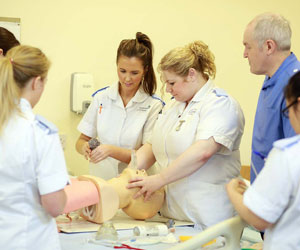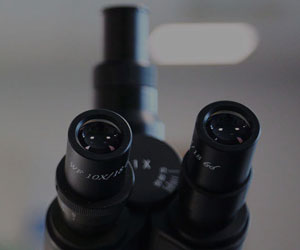This module will equip you with skills and knowledge you need for a successful career in General Medical Ultrasound. Tuition is given by leading experts in the field. For those already in possession of a CASE accredited ultrasound qualification (PGCert or above) who wish to expand their scope of practice this module can be taken as a single module for continuing professional development.
This module covers the following:
- Normal and pathological conditions, relating to imaging of the abdomen, digestive system, renal tract, retro-peritoneum, thyroid and male reproductive tract/organs and the abdominal aorta and its branches.
- Dealing with the technical difficulties relating to the challenges of general medical ultrasound; adaption of technique/advancing skills.
- Techniques relating to superficial and peripheral structures; soft tissue masses.
- Complementary techniques including contrast agent and colour and spectral Doppler applications.
- Supplementary Imaging techniques: role of CT, MR and other diagnostic tests/procedures.
- Report writing relating to general medical ultrasound. Preparatory requirements; rationale for ultrasound examinations.
- Regional cross sectional anatomy.
The module is part of the MSc Medical Imaging (Ultrasound) programme, which is accredited by CASE (Consortium for the Accreditation of Sonographic Education), allowing you to practice ultrasound in the UK and some overseas countries, on successful completion of the programme. The module itself is not CASE accredited as a stand-alone module.
Course options
This course is also available as part of a postgraduate degree.
PgC Medical Imaging (Ultrasound)
PgD Medical Imaging (Ultrasound)
MSc Medical Imaging (Ultrasound) (part-time)
Graduate destinations
On successful completion of the course, you will be able to provide evidence of preparation for practice to the standards required for a first post-qualification sonographer role. We have consulted with local ultrasound service partners who have confirmed that this would allow employment of graduates in most regional NHS contexts.
However, applicants from a non-health care background should note that, at present, employment in some NHS Trusts would not be possible due to the requirement for professional registration. These potential restrictions on employment will be discussed with you during the application process and you will be asked to sign a memorandum of agreement confirming your understanding and acceptance.
Course outline
Course summary
The overall aim of this module is to enable you to develop a thorough knowledge and understanding complex anatomy and physiology relating to General Medical Ultrasound and the theoretical principles and applications of the more complex imaging techniques and associated pathology applied to this area.
Please note optional module choices are made by the placement and not you the student, and these are based fundamentally on patient caseload availability, mentor support and service need.
Module elements
Year one
- HMSU7066 General Medical Ultrasound (Theory)
- HMSU9066 General Medical Ultrasound (Clinical Practice)
(Please note both elements must be studied together)
Programme Specification
Assessment, Feedback, and Teaching and Learning methods
Full details are available in the programme specification.
Timetables
The teaching timetable should be available from the end of August. Access to the timetable is through the Student Hub – you will be able to access the Student Hub after you have completed online registration. The teaching day is 9am to 6pm, Monday to Friday; please keep your other commitments open until confirmation of your teaching timetable, and bear in mind that many courses will offer placements or fieldwork which sometimes extends into the evenings and weekends.
Entry requirements
Have a question about our entry requirements?
Entry Requirements
1st or 2nd class honours degree in a science or healthcare subject.
Students with other qualifications may be admitted to the course, please contact the Enquiry Centre for further details. Accreditation of Prior Learning (APL) may be considered for relevant prior learning at the same academic level.
Selection criteria
- This module is only available for stand-alone study, where applicants can prove underpinning relevant previous study, such as an existing CASE accredited ultrasound award from this or another UK academic institution or successful APL against the minimum core modules for PGCert.
- You must have organised and secured access to a suitable clinical placement, mentor and patient case load for a minimum of 15 hours per week, for the duration of the module. If your placement is terminated for any reason, the university cannot assist you in finding another placement. If a suitable clinical placement cannot be found in these circumstances, you will be required to withdraw from the course.
- Applicants should be eligible for registration by their respective UK professional or regulatory body e.g. Health & Care Professions Council (HCPC), General Medical Council (GMC), Nursing & Midwifery Council (NMC), Society of Vascular Technologist (SVT). You will also need to provide one reference in support of your application, from the department offering a clinical placement who can confirm your suitability to train in ultrasound.
- Overseas students can only be considered if they are able to secure a suitable placement in the UK or Ireland. Regretfully the university are unable to assist in this process.
-
You will be required to pass an element of pre-course assessment, carried out in the department sponsoring you. It is the sponsoring department’s responsibility to facilitate this assessment and this will be carried out to ensure that you show an aptitude for Ultrasonography. You will need to undertake a preliminary practical assessment to demonstrate the relevant psychomotor skills such as hand-eye co-ordination, pattern recognition and spatial awareness. The assessment will be of an informal nature, carried out by experienced practitioners in your clinical placement, who will then provide a written reference to confirm your suitability.
Before being accepted onto the course, all applicants will be interviewed, usually by telephone. Interviewers from the course team will, amongst other attributes, be looking for a commitment to further study, an understanding of content and standard of the course and interpersonal skills.
As part of the recruitment process, applicants may be assessed for their values using the core requirements set out in the Value Based Recruitment (VBR) Behaviour Framework as outlined in the NHS Constitution.
Application information
Applications should be made online directly to the university via the apply button above. If you need more details or guidance, please contact enquirycentre@cumbria.ac.uk. There is no official closing date but we would encourage you to apply as early as possible, as many courses are competitive.
Please note that the direct entry application system will not recognise your current Student IT Network login. Please select the New User option from the Apply Now button.
We like all our applicants to demonstrate an understanding of what the role of a sonographer involves and a clear rationale for applying for this award. Applications cannot be considered without a suitable clinical placement being secured. This must be in place before commencing the course.
Please email a completed copy of the pre-course checks document to accompany your application to pgadmissions@cumbria.ac.uk.
Student finance
We have a wide range of scholarships, bursaries, grants and funds available to support you throughout your studies with us. This includes the Cumbria Bursary - a non-repayable bursary designed to support first year students with a household income of less than £25,000..
Student Finance Tuition Fee PolicyResources and facilities
We officially opened our high-tech ultrasound skills hub, one of the largest installations of its kind in the world, last year.
The skills hub is equipped with revolutionary ultrasound simulators which will enable students to gain basic skills by experiencing lifelike, hands-on training before entering the busy clinical environment of sonography.
With a UK-wide shortage of sonographers being identified by the government*, this half million-pound project was funded jointly by the university and a grant from Health Education North West.
The University of Cumbria has responded to the sonography workforce gap by expanding its portfolio of ultrasound courses to meet the needs of an increasingly pressured health care system. This advanced virtual-reality technology has facilitated the provision of a new accelerated route to a medical ultrasound postgraduate degree, aimed at students from non-clinical health and sciences backgrounds.
Emma Timperley (24), from Lancaster is one of this first cohort of full time postgraduate sonography students at the university. She says:
“My first degree was in biomedical sciences, but this postgraduate course will allow me to become a trained sonographer in two years. I had the opportunity to use this new technology for a few weeks before going out on my first placement and it’s been invaluable.
It not only gives you a real feel for the orientation of the ultrasound, but also provides all the basic information about anatomy that you need at this stage.”
Professional lead for medical sciences at the university, Charles Sloane, says:
“Students at the University of Cumbria are very fortunate to have access to this world-leading ultrasound skills development facility”.
“It will enable us to help address the shortage of sonographers that currently exists and ensure patients can continue to access the services they need to get a quick diagnosis of potentially life-threatening conditions, such as cancer.”
ScanTrainer, created by MedaPhor, is a specialist ultrasound skills training simulator made using ‘real feel’ technology which gives students a chance to learn what it feels like to carry out a real-life scan, preparing them for what they’ll experience in a clinical environment. In addition, its ‘virtual tutor’ technology means students are in control of their own learning, both in and out of class time.
Iain Dunbar, International Sales Manager at MedaPhor, comments:
“The new skills lab signals that the ultrasound education industry in the UK, and across the world, is finally responding to the demand for sonography skills as ultrasound grows in popularity as a diagnostic modality. The university’s approach is truly pioneering and we are delighted to be at the forefront alongside them.”
The new ‘Ultrasound Skills Hub’ at the university’s Lancaster campus was officially opened on 17 March 2016 by the then university vice chancellor Professor Peter Strike. An audience of invited guests from the healthcare professions was also given a demonstration of the new scanning equipment by postgraduate students.






